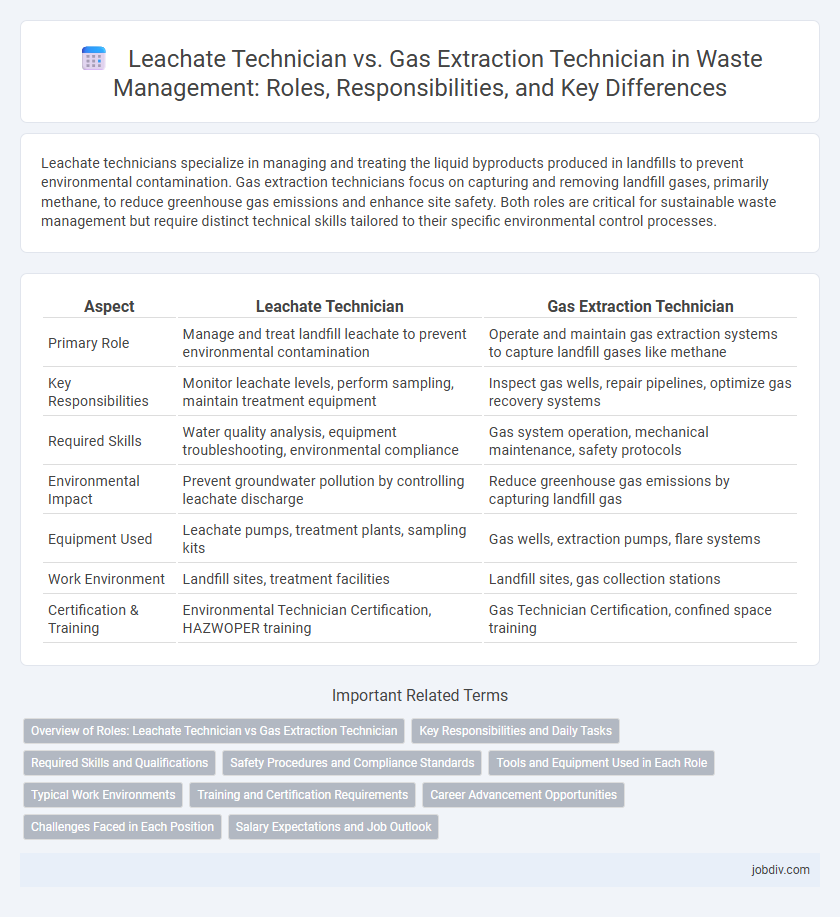Leachate technicians specialize in managing and treating the liquid byproducts produced in landfills to prevent environmental contamination. Gas extraction technicians focus on capturing and removing landfill gases, primarily methane, to reduce greenhouse gas emissions and enhance site safety. Both roles are critical for sustainable waste management but require distinct technical skills tailored to their specific environmental control processes.
Table of Comparison
| Aspect | Leachate Technician | Gas Extraction Technician |
|---|---|---|
| Primary Role | Manage and treat landfill leachate to prevent environmental contamination | Operate and maintain gas extraction systems to capture landfill gases like methane |
| Key Responsibilities | Monitor leachate levels, perform sampling, maintain treatment equipment | Inspect gas wells, repair pipelines, optimize gas recovery systems |
| Required Skills | Water quality analysis, equipment troubleshooting, environmental compliance | Gas system operation, mechanical maintenance, safety protocols |
| Environmental Impact | Prevent groundwater pollution by controlling leachate discharge | Reduce greenhouse gas emissions by capturing landfill gas |
| Equipment Used | Leachate pumps, treatment plants, sampling kits | Gas wells, extraction pumps, flare systems |
| Work Environment | Landfill sites, treatment facilities | Landfill sites, gas collection stations |
| Certification & Training | Environmental Technician Certification, HAZWOPER training | Gas Technician Certification, confined space training |
Overview of Roles: Leachate Technician vs Gas Extraction Technician
Leachate Technicians manage the collection and treatment of contaminated liquid produced by waste decomposition in landfills, ensuring environmental compliance and preventing soil and groundwater pollution. Gas Extraction Technicians focus on the installation and maintenance of systems that capture landfill gases like methane to reduce greenhouse gas emissions and enable energy recovery. Both roles are critical for sustainable landfill management, addressing different aspects of waste byproducts through specialized technical expertise.
Key Responsibilities and Daily Tasks
Leachate Technicians manage the collection, treatment, and disposal of liquid waste generated from landfill sites, monitoring leachate levels and ensuring compliance with environmental regulations. Gas Extraction Technicians focus on extracting landfill gases like methane through well maintenance, monitoring gas flow rates, and optimizing energy recovery systems to reduce greenhouse gas emissions. Both roles require routine site inspections, data recording, and coordination with environmental engineers to maintain landfill safety and sustainability.
Required Skills and Qualifications
Leachate Technicians require expertise in wastewater treatment, chemical handling, and environmental compliance, alongside proficiency in monitoring leachate collection systems and understanding hazardous waste regulations. Gas Extraction Technicians must possess skills in gas monitoring, well installation, and maintenance, with knowledge of landfill gas composition, safety protocols, and mechanical troubleshooting. Both roles demand technical certifications related to environmental science or engineering and experience with site-specific health and safety standards.
Safety Procedures and Compliance Standards
Leachate Technicians adhere to strict safety procedures involving hazardous liquid handling, utilizing protective gear and containment systems to prevent environmental contamination. Gas Extraction Technicians follow comprehensive compliance standards, including monitoring methane levels and maintaining gas collection infrastructure to mitigate explosion risks and ensure regulatory adherence. Both roles require rigorous training in site-specific safety protocols and ongoing compliance audits to uphold environmental and occupational safety standards.
Tools and Equipment Used in Each Role
Leachate Technicians typically utilize specialized pumps, collection tanks, and water quality testing kits to monitor and manage the liquid waste that percolates through landfill materials. Gas Extraction Technicians rely on vacuum pumps, gas analyzers, and flare systems to capture and treat methane and other landfill gases safely. Both roles require the use of safety gear such as respirators and monitoring instruments, but their primary tools are tailored to the distinct mediums they handle--liquid leachate versus gaseous emissions.
Typical Work Environments
Leachate Technicians typically work in landfill sites and wastewater treatment facilities, managing the collection, treatment, and disposal of contaminated liquids to prevent environmental pollution. Gas Extraction Technicians operate primarily in landfills and biogas plants, focusing on capturing and processing landfill gases such as methane to reduce greenhouse gas emissions and generate renewable energy. Both roles require fieldwork in potentially hazardous outdoor environments but differ in their specific focus on liquid waste management versus gas extraction systems.
Training and Certification Requirements
Leachate Technicians require specialized training in environmental safety, hazardous waste handling, and wastewater treatment processes, often obtaining certifications such as HAZWOPER and OSHA safety courses. Gas Extraction Technicians must undergo training focused on gas monitoring, drilling operations, and methane extraction techniques, commonly holding certifications like confined space entry and gas detection equipment operation. Both roles demand ongoing education to comply with evolving environmental regulations and ensure safe, efficient landfill management.
Career Advancement Opportunities
Leachate Technicians gain specialized expertise in wastewater management and treatment systems, positioning them for roles in environmental compliance and hazardous waste management. Gas Extraction Technicians develop skills in monitoring and maintaining landfill gas collection systems, opening pathways to jobs in renewable energy and emissions control. Career advancement for both roles often includes certification programs and opportunities to lead environmental health and safety teams.
Challenges Faced in Each Position
Leachate Technicians face challenges such as managing toxic wastewater, preventing environmental contamination, and maintaining complex treatment systems under variable landfill conditions. Gas Extraction Technicians confront difficulties in safely capturing and controlling landfill gas emissions, monitoring methane levels, and ensuring equipment efficiency to prevent hazardous leaks. Both roles require strict adherence to environmental regulations and proactive maintenance to mitigate health and safety risks.
Salary Expectations and Job Outlook
Leachate Technicians typically earn an average salary ranging from $40,000 to $55,000 annually, reflecting specialized skills in managing and treating landfill leachate to prevent environmental contamination. Gas Extraction Technicians often command higher wages, between $45,000 and $65,000 per year, due to responsibilities involving the monitoring and extraction of landfill gases like methane for energy recovery. Job outlook for both roles remains steady, driven by increasing regulatory pressures and the expansion of sustainable waste management practices globally.
Leachate Technician vs Gas Extraction Technician Infographic

 jobdiv.com
jobdiv.com